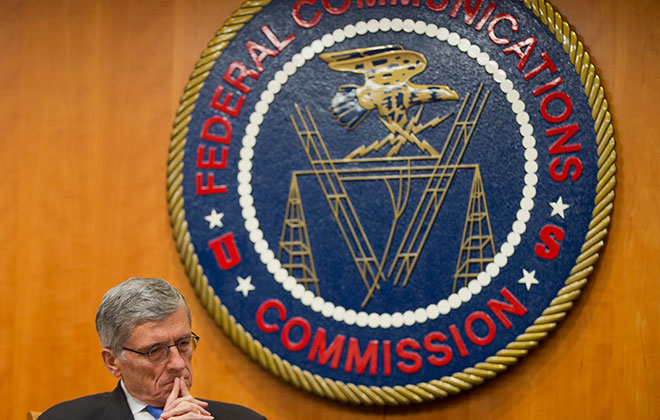Net neutrality OK’d in FCC partisan vote

The FCC has agreed to impose strict new regulations on Internet service providers like Comcast, Verizon and AT&T. The regulatory agency voted 3-2 Thursday in favor of rules aimed at enforcing what's called "net neutrality." That's the idea that service providers shouldn't intentionally block or slow web traffic, creating paid fast lanes on the Internet.
A sharply divided Federal Communications Commission on Thursday voted itself sweeping new powers to regulate the business practices of the nation’s Internet service providers in a bid to ensure that they don’t discriminate in the way they deliver broadband services.
The party-line vote of 3 to 2 represents a triumph for President Obama, who backed the new policy, and for “Net neutrality” activists, who have lobbied for years for tough regulations. But it was denounced by critics who say it’s an unnecessary imposition of federal power that will stifle investment and innovation.
And because the new regulations are likely to be challenged in federal court, they may not take full effect for years.
Net neutrality is the idea that all kinds of Internet data traffic should be handled in a nondiscriminatory fashion. For instance, the broadband provider Comcast Corp. should not be able to block or slow down video streams from the popular Netflix video service in order to give Comcast’s own video offerings an advantage. In addition, Net neutrality advocates say, broadband providers should not be allowed to offer an Internet “fast lane” so that Netflix, for instance, could pay to have its videos delivered with higher quality than those offered by, say, Amazon.com.
The FCC has attempted in the past to impose these standards on Internet companies but has been blocked by court rulings. The most recent setback came in January of 2014, when a federal court in Washington rejected the FCC’s argument that a provision of the Communications Act of 1996 gave it authority over the Internet. But the court suggested that if the commission reclassified Internet providers as telecommunications companies, similar to traditional telephone providers, it could regulate Internet companies under Title II of the Communications Act of 1934.
On Thursday, the FCC”s three Democratic commissioners voted in favor of this reclassification, while its two Republicans voted no. As a result, the FCC can now investigate the business practices of Internet companies and block activities found to harm the public interest. The agency can also fine companies found to be employing “unreasonable” business practices.
Don't miss out on what's happening!
Stay in touch with breaking news, as it happens, conveniently in your email inbox. It's FREE!
The FCC says it won’t apply some sections of Title II, including price controls. That means rates charged to customers for Internet access won’t be subject to preapproval. But the law allows the government to investigate if consumers complain that costs are unfair.
Massachusetts Senator Edward J. Markey, a longtime Net neutrality advocate, hailed the FCC’s decision. “I think that today is a declaration of innovation day for the Net.” said Markey, a Democrat. “This is going to guarantee and enshrine the open architecture of the Internet.”
Mayor Martin J. Walsh of Boston also backed the new regulations. “Strong rules supporting an open internet protect broadband consumers and preserve a level playing field for our innovative technology businesses,” Walsh said in an e-mailed statement.
The two Republican FCC commissioners, Mike O’Rielly and Ajit Pai, who voted against the plan, alleged that Obama unfairly used his influence to push through the regulations, calling the plan a “half-baked, illogical, internally inconsistent, and indefensible document.”
And a prominent Democratic think tank, the Progressive Policy Institute, was almost as critical.
”We worry that empowering the FCC with new powers doesn’t much make any sense,” said institute president Will Marshall. He said that Internet companies are not engaging in the unfair practices the FCC seeks to ban. “There are some phantom menaces here,” Marshall said. “Why do Democrats and progressives want to identify themselves with heavy-handed regulation, in a market that’s thrived without it?”
Broadband providers AT&T Inc. and Verizon Communications Inc. denounced the FCC vote. Verizon senior vice president Michael E. Glover called it “a radical step that presages a time of uncertainty for consumers, innovators, and investors.” AT&T senior executive vice president Jim Cicconi wrote in a blog post that “we once again face the uncertainty of litigation, and the very real potential of having to start over” — a comment that suggests AT&T may challenge the FCC in court.
Meanwhile, Republicans in Congress hope to enact legislation that would place more limited Net neutrality restrictions on broadband providers. But because Obama had urged the FCC to adopt its new policy, he would almost certainly veto any alternative bill.
Before the Net neutrality vote, the FCC overrode state laws that bar municipalities from building or expanding broadband networks. Chattanooga, Tenn., and Wilson, N.C., had filed petitions with the agency seeking the right to expand their municipal networks to neighboring towns. The FCC approved the petitions, setting a precedent for other local governments that might want to do the same.
Nineteen states restrict municipal broadband networks, many with laws that were lobbied for by cable and telephone companies. Advocates of those laws say they protect taxpayers from municipal projects that are expensive, can fail, or may be unnecessary.
© 2015 The New York Times Company



